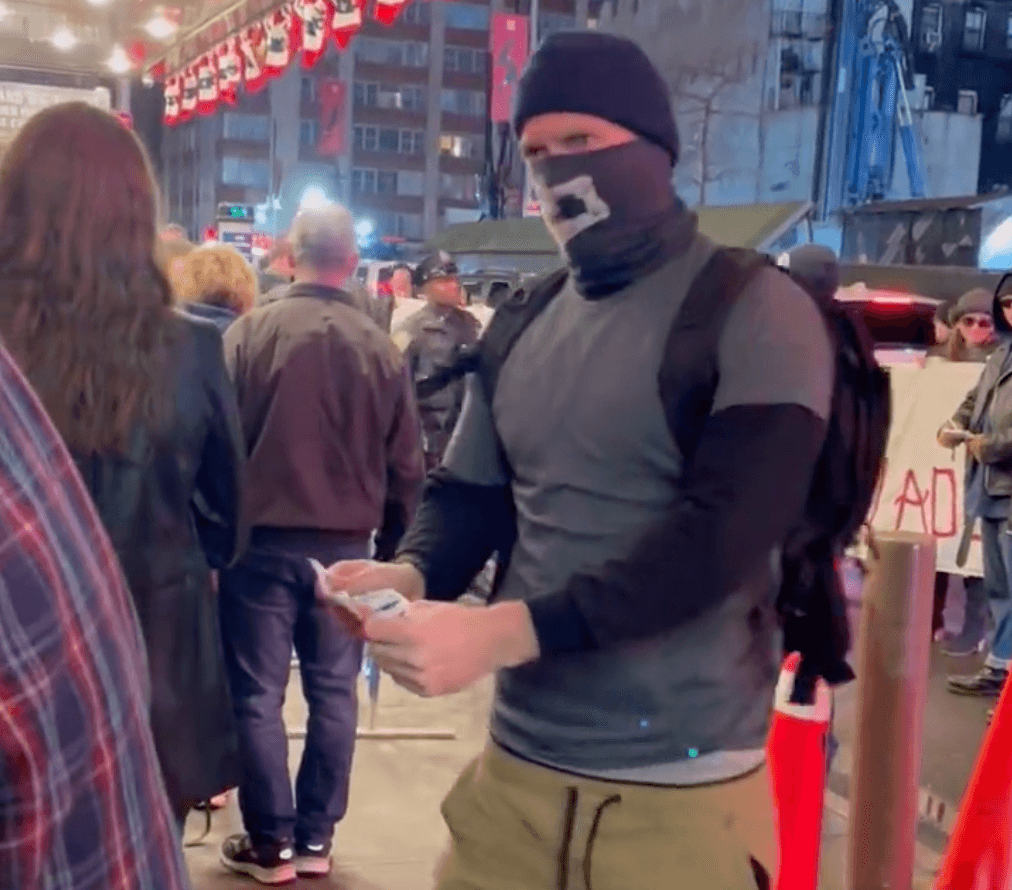Neo-Nazis protest outside Broadway revival of play about lynching of a Jewish man
‘Parade’ star Ben Platt denounced the group, saying it illustrates why the show about Leo Frank is more relevant than ever

Graphic by Angelie Zaslavsky
Members of a neo-Nazi hate group accosted theatergoers on Tuesday evening outside Parade, a Broadway play about the lynching of a Jewish man.
Masked individuals accused the people in line outside the Bernard B. Jacobs Theater, where Parade is in preview performances, of paying $300 to “worship a pedophile.”
The National Socialist Movement, a neo-Nazi hate group, is protesting outside of the Broadway revival of “Parade,” stating that Leo Frank, the subject of the musical, was a pedophile. pic.twitter.com/wbGMjRubZL
— Jake Wasserman (@jacobhwasserman) February 22, 2023
Parade stars Ben Platt and is based on the true story of Leo Frank, a Jewish man convicted of raping and killing a non-Jewish teenager in 1913. The case became a flashpoint for antisemitic tensions in the United States. Frank’s death sentence was commuted to life in prison by the outgoing governor of Georgia, but after being transferred to a new prison, Frank was kidnapped by a lynch mob and hanged.
His death had a significant impact, including raising the profile of both the Anti-Defamation League and the Ku Klux Klan. The ADL successfully lobbied for a posthumous pardon.
The play made its Broadway debut in 1998, winning several Tony awards.
Madeleine Blossom was one of the people lined up outside the theater. She said everything had seemed normal until she heard a “booming” voice calling Frank a pedophile. She saw two men, one wearing a suit and another a skull mask, trying to hand flyers to the people lined up, she said. Another group was holding homemade signs identified themselves as members of the National Socialist Movement, whose website describes them as “America’s Nazi Party.”
She said that when one person in line told the men to leave, the man in the mask replied, “Shut up, kike.”
When another man held up his phone to take a video or photo, she said the man in the mask grabbed it and threw it into the street. While there were police officers nearby, Blossom said she couldn’t tell if they did anything about the phone. She said she overheard a conversation between one of the men and a police officer where the officer said, “As long as you’re peaceful, we’ll leave you alone.”
“Some people were shouting back. Most of us were quietly like, ‘I don’t understand what’s happening,’” she said.
She added that it appeared theater employees seemed unaware of what was transpiring outside, but that director Michael Arden addressed the audience before the performance. While he did not mention the demonstration specifically, Blossom said he did say the play is a powerful one “especially tonight.”
In an Instagram post, Platt said he felt “compelled” to address what had happened outside the theater. Platt, who is Jewish, said he became aware of the protest after the performance.
He called the group “disgusting” and said they were “spreading evil” through the “ugly and scary” protest.
But he said the incident also provided a reminder that the themes of the play are still timely.
“I just think now is the moment for this particular piece,” he said.
In a statement sent to the Forward, the play’s producers said the “vileness on display last night” lent even more urgency to the show’s message.
“We stand by the valiant Broadway cast that brings this vital story to life each night,” they added.
The producers did not answer questions sent by the Forward about whether any additional security measures would be taken around the theater.
The Broadway League, a trade organization that represents theater owners and producers, also condemned the demonstrators in an email to the Forward, saying: “The Broadway League stands firmly against antisemitism and all forms of harassment. The League will continue its work to ensure that theatre is a safe and welcoming experience for all.”
Phone calls to the Shubert Organization, which owns the theater, were not answered.
Members of the Jewish theater community planned to meet Wednesday afternoon to “process the events.”
Correction: An earlier version misspelled the name of Madeleine Blossom.

















